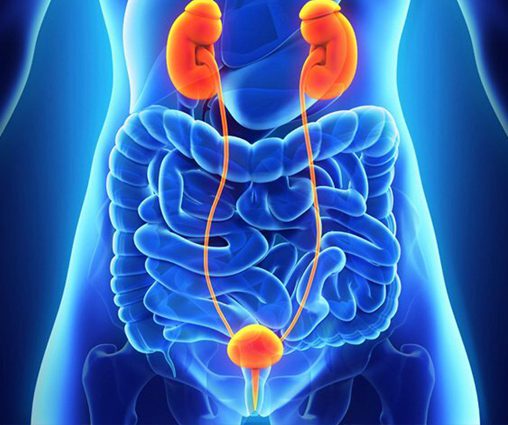Uro-Oncology
Home » Uro-Oncology
Enquire Now
Mahatma Gandhi Cancer Hospital & Research Institute has a specialized department of Uro-Oncology that deals with cancers which occur in women/men including Renal/Kidney cancer, Bladder Cancer, Prostate Cancer, Penise Cancer, Adrenal tumors. These cancers are dealt with through specialized surgeries like Complex Nephron-Sparing Surgeries (Robotic & Open) for Small Renal Mass, Robotic Nerve-Sparing Radical Prostatectomy for early continence erectile function, Radical Cystectomy for Bladder Cancer (Open & Robotic), Radical Nephrectomy (Open, Lap, Robotic), Post-Chemo RPL Cancer For Testicular Malignancy, Radical, TURBT & Channel TURP’s, Nephro Eurotrectomy for Upper Tract Malignancy (Open, Robotic & Lap).
- Robotic Nephron Sparing Surgery for Kidney Cancer
- 3D Imaging & Al in Kidney Cancer
- Radical Cystoprostatectomy with Ileal Neobladder (Internal Bladder reconstruction)
- PSMA PET Scan for Advanced Prostate Cancer
- Robotic Procedure for Prostate Cancer, Bladder Cancer & Kidney Cancer
- Penile Preserving Procedures in Penile Cancer
- Stoma Clinic
- PSMA Lutetium Therapy for Metastatic Disease Immunotherapy

What is Uro-oncology/ Genito-urinary oncology?
Uro-oncology/ Genito-urinary oncology is a specialized field in oncology, focusing on cancers arising from the urinary tract and the male reproductive organs. These include Prostate Cancer, Kidney Cancer, Adrenal Tumours, Bladder Cancer, Ureteric Tumours, Testicular Cancer, and Cancers of the Penis. The urologist who specializes in the management of Genito-Urinary Cancers is called Uro-Oncologist.
How common are Genito-urinary cancers?
Tumours of the genitourinary system are among the most common in clinical practice, particularly in India. Its practice is focusing on increased screening programmes, improved cancer awareness in the general population, and the advent of newer imaging modalities. The cancers of the Genito-urinary system are being detected at early stages with good treatment outcomes.
Can urological cancers be prevented?
We cannot prevent urological cancers entirely. There are, however, a few precautions you may take to lower your chance of having urological cancer:
- Quit Smoking: Quitting smoking can help you lower your chance of developing important urological malignancies such as kidney cancer, bladder cancer, penile cancer, and others.
- Maintain a Healthy Weight: Obesity is a major risk factor for the majority of urological malignancies. Regular exercise and proper eating habits can help you maintain a healthy weight and lower your chance of developing urological cancer.
- Regular Screening and Check-ups: Age is a risk factor for urological cancers. Therefore, if you are aged 40 and above or have a family history of urological cancers, you may consider regular screening and opt for annual check-ups, which support early detection and timely treatment.
Can Urological cancers be cured?
Most of the cancers are curable if they are detected at initial stages, few can be treated even at relatively later stages with multiple treatment modalities. Cancers in their advanced stages are difficult to treat. However, palliative and supportive care can enhance the quality of life.
Can we diagnose the cancer at an early stage?
The answer is yes! Early identification of cancer improves the odds of effective therapy. Cancers can only be detected at an early stage with screening or regular health checks. Scanners can identify kidney, adrenal, bladder, and testicular cancers, serum PSA (prostate-specific antigen) tests can detect prostate cancer, and clinical examinations can detect penile tumours. Genito-urinary cancers, in particular, are silent in the initial stages, and screening and regular health check-ups help in early detection. Once suspicious lesions are detected, confirmation can be done by tissue biopsy (Piece of tissue for microscopic assessment, i.e. needle biopsy of the prostate, endoscopic biopsy for bladder, and edge biopsy for penile cancers. At times, the entire tumour is removed and sent for microscopic examination. For example, kidney, bladder, and testicular cancers.
Is it possible to remove only the tumour (Cancer) without sacrificing the entire affected organ?
Again the answer is yes! We at Mahatma Gandhi Cancer Hospital & Research Institute strongly believe in preserving the affected organ as much as possible and at the same time completely removing the tumour or cancer. In other words. Our goal of management is not only to achieve a complete oncological outcome but also a good functional outcome. For example, we try to preserve as many kidneys as possible for kidney cancers. This procedure is called Nephron Sparing Surgery or Partial Nephrectomy. Similarly, we routinely perform various organ-preserving surgeries such as endoscopic resection of bladder tumour, partial penectomy, Glansectomy, and Glans resurfacing and local excision of penile cancers, rarely testis sparing surgery for small testicular tumours. However, these procedures are considered in only special circumstances and as per the discretion of the surgeon.
Can cancer surgeries be performed by minimally invasive techniques, avoiding big incisions?
Again the answer is yes! Our institute has experienced and distinguished surgeons, reputed for laparoscopic and Robotic surgeries. Most of the cancer procedures at our hospital are being done by minimally invasive techniques like laparoscopy and Robotic surgeries, which can limit the size of incisions needed, less blood loss, and lessen wound healing time, associated pain, and risk of infection. This eventually aids in an early and comfortable post-operative recovery.








